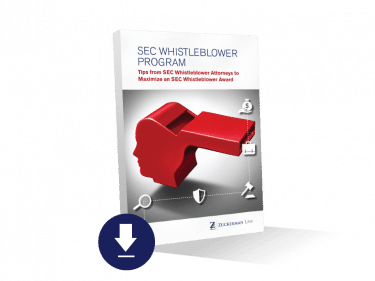An article titled 5 Questions To Ask Before Suing Over Whistleblower Theft quotes whistleblower lawyer Jason Zuckerman about employee “self-help” discovery, which the article defines as “taking documents or other information from an employer to blow the whistle or back up a retaliation claim.” The article discusses options available to companies seeking to combat an employee’s removal of documents to support a whistleblower claim, including civil claims for breaching an employment agreement or stealing trade secrets. Law360 quotes Zuckeman about his perspective on “self-help discovery”:
Another factor to consider is whether the employee took information that was narrowly tailored toward supporting a whistleblower claim or cast a wide net that swept up information with no relationship to his or her allegations.
Zuckerman Law’s Jason Zuckerman, who represents whistleblowers, says he advises clients to take only information pertaining directly to their claim. If a worker steals trade secrets to engage in unlawful competition, the employer would be entitled to protect its intellectual property regardless of any whistleblower claim, he points out.
“However, what I see more often is that employers use the pretext of protecting confidential information as a means to retaliate against a whistleblower by aggressively prosecuting frivolous claims,” Zuckerman said. “That tactic can backfire in several respects.”
Suing a whistleblower for engaging in self-help discovery can backfire by giving rise to a retaliation claim, or inviting heightened scrutiny by regulators for interfering with an investigation. Fortunately, the SEC’s rules implementing the whistleblower reward provision of the Dodd-Frank Act include a provision barring companies from using confidentiality agreements to prevent employees from disclosing information to the SEC:
§ 240.21F-17 Staff communications with individuals reporting possible securities law violations.
(a) No person may take any action to impede an individual from communicating directly with the Commission staff about a possible securities law violation, including enforcing, or threatening to enforce, a confidentiality agreement (other than agreements dealing with information covered by § 240.21F-4(b)(4)(i) and § 240.21F-4(b)(4)(ii) of this chapter related to the legal representation of a client) with respect to such communications.
(b) If you are a director, officer, member, agent, or employee of an entity that has counsel, and you have initiated communication with the Commission relating to a possible securities law violation, the staff is authorized to communicate directly with you regarding the possible securities law violation without seeking the consent of the entity’s counsel.










